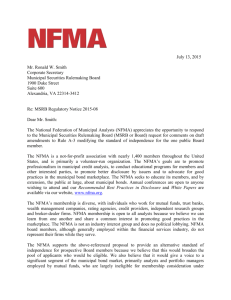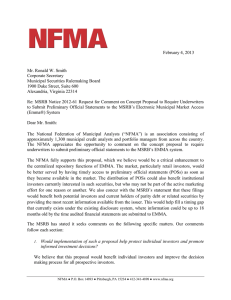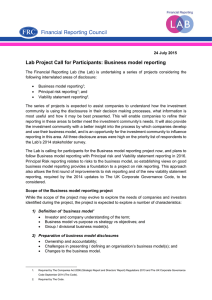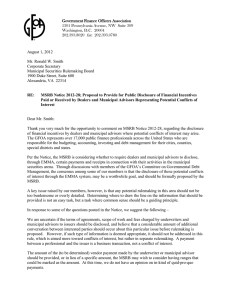March 6, 2013 Mr. Ronald W. Smith Corporate Secretary
advertisement
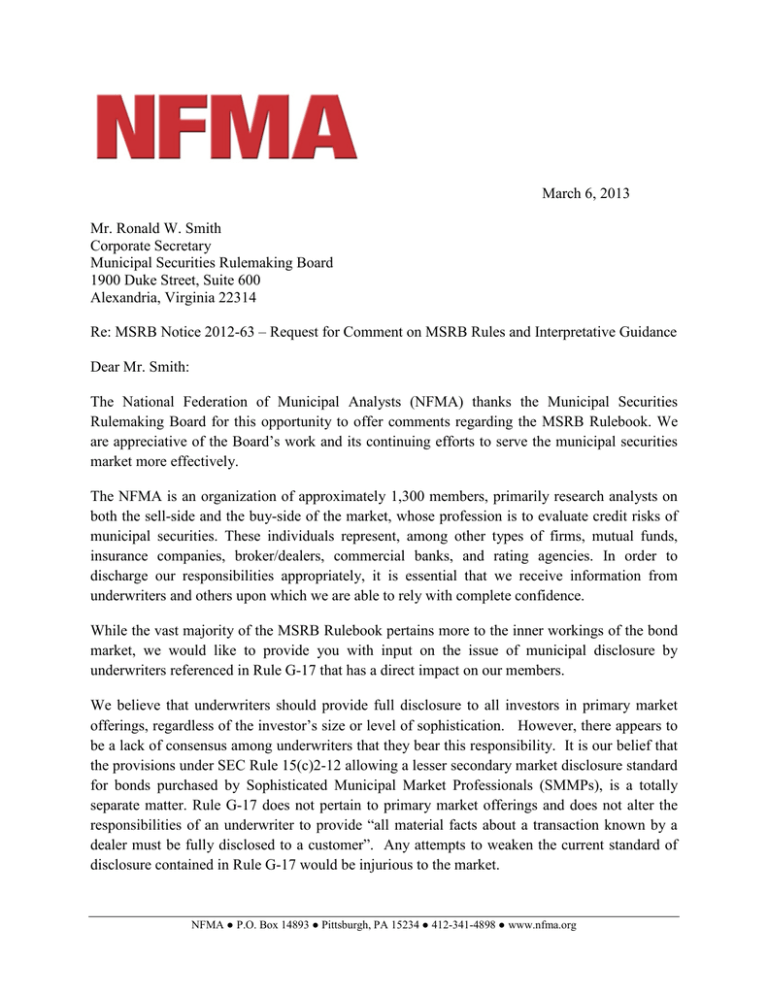
March 6, 2013 Mr. Ronald W. Smith Corporate Secretary Municipal Securities Rulemaking Board 1900 Duke Street, Suite 600 Alexandria, Virginia 22314 Re: MSRB Notice 2012-63 – Request for Comment on MSRB Rules and Interpretative Guidance Dear Mr. Smith: The National Federation of Municipal Analysts (NFMA) thanks the Municipal Securities Rulemaking Board for this opportunity to offer comments regarding the MSRB Rulebook. We are appreciative of the Board’s work and its continuing efforts to serve the municipal securities market more effectively. The NFMA is an organization of approximately 1,300 members, primarily research analysts on both the sell-side and the buy-side of the market, whose profession is to evaluate credit risks of municipal securities. These individuals represent, among other types of firms, mutual funds, insurance companies, broker/dealers, commercial banks, and rating agencies. In order to discharge our responsibilities appropriately, it is essential that we receive information from underwriters and others upon which we are able to rely with complete confidence. While the vast majority of the MSRB Rulebook pertains more to the inner workings of the bond market, we would like to provide you with input on the issue of municipal disclosure by underwriters referenced in Rule G-17 that has a direct impact on our members. We believe that underwriters should provide full disclosure to all investors in primary market offerings, regardless of the investor’s size or level of sophistication. However, there appears to be a lack of consensus among underwriters that they bear this responsibility. It is our belief that the provisions under SEC Rule 15(c)2-12 allowing a lesser secondary market disclosure standard for bonds purchased by Sophisticated Municipal Market Professionals (SMMPs), is a totally separate matter. Rule G-17 does not pertain to primary market offerings and does not alter the responsibilities of an underwriter to provide “all material facts about a transaction known by a dealer must be fully disclosed to a customer”. Any attempts to weaken the current standard of disclosure contained in Rule G-17 would be injurious to the market. NFMA ● P.O. Box 14893 ● Pittsburgh, PA 15234 ● 412-341-4898 ● www.nfma.org NFMA Comments on MSRB Notice 2012-63 ` Page 2 of 2 The concern regarding full disclosure in primary market offerings is especially important to issues of lower quality that are sold to investors willing to take greater risks than are generally found in the municipal market. These issues are often rated in the lowest investment grade category or are non-rated, and, as such, bear a higher risk of default. Such issues tend to be very complex, often consisting of one-off transactions that often require an analyst to start from scratch in providing a credit assessment. While the gestation period of some of these deals can range from several months to more than a year, analysts invariably are faced with doing complex analyses in a very limited period of time. Given these restrictions, investors must rely on the disclosure by underwriters in the offering statement and/or technical engineering or feasibility studies that are provided. The investors, in these instances, are highly dependent on the material provided by underwriters, who must be held to the highest disclosure standards in order to ensure that the market functions in the optimum manner. Also supporting our view that there should be no distinction made on the standard of disclosure for deals sold to SMMPs is that in many instances these bonds are later sold to retail investors in the secondary market when bond denominations decline or initial restrictions lapse. Various safeguards have often been used to ensure that more complex deals are sold only to sophisticated investors, including the signing of so-called “Big Boy” letters, acknowledgement of being an institutional investor or issuing bonds with larger minimum denominations. But, since ultimately bonds may end up sold to retail investors at a later date, there should be caution in creating different levels of primary market disclosure responsibility based on initial market participants. The NFMA urges the Board to re-emphasize in its interpretative guidance that underwriters delivering offering documents and information to investors, whether SMMPs or otherwise, must be held to the highest standards of disclosure, requiring that all material information known to the underwriter be fully disclosed to prospective investors. This is the intent of federal and state anti-fraud statutes. Regarding Rule G-17 specifically, permitting disparate treatment among investors over material disclosure would be an example of the “unfair dealing” that this Rule was intended to prevent. Thank you for your consideration. Sincerely, /s/ William Oliver Industry & Media Liaison NFMA NFMA ● P.O. Box 14893 ● Pittsburgh, PA 15234 ● 412-341-4898 ● www.nfma.org
